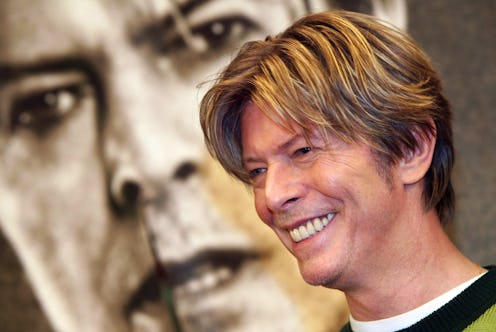The world lost one of its great artists on January 10, 2016. Two days after his 69th birthday, and following an 18-month bout of cancer, legendary rock star David Bowie passed away. For every kid who grew up with Labyrinth and Space Oddity, the news hit hard. As Benjamin Schwartz's commemorative New Yorker cartoon noted, quoting Bowie's epic tune, "The stars look very different today."
Bowie may be gone, but he left behind so much for us to love and appreciate. I don't just mean his music and films, either. Bowie was a true progressive.
In the early 1980s, MTV's Mark Goodman interviewed Bowie, who was promoting "Let's Dance" at the time. Bowie had a few questions of his own, however, and took the opportunity to confront the network on its lack of black talent. Goodman tried to shrug off the discrimination with arguments about giving people what they wanted to hear and — bafflingly — catering to the perceived racism of "the Midwest [where people] would be scared to death by ... a string of other black faces or black music." Bowie didn't back down, but instead charged MTV's taste-maker status:
Don't say, 'Well, it's not me, it's them.' Is it not possible it should be a conviction of the station and of the radio stations to be fair... to make the media more integrated?
You can't talk about Bowie without discussing his sexuality. In an article for The Daily Beast, Tim Teeman observes: "He said he was gay, then bisexual, then married women twice and had children." Bowie's identification as gay and bi has always been the subject of much scrutiny and debate. His later interviews seem to indicate that the claims were all a part of his Ziggy Stardust persona, without any real substance. But for young LGBTQ individuals in the '60s, '70s, and '80s, Bowie's sexuality and his gender performance were pivotal, regardless of their basis in reality. Here was an idol who broke the rules, who made androgyny a fashionable aegis for those who might fear to be themselves.
In light of all this, it's really no surprise that David Bowie's reading list — that is, his 100 favorite books — is so diverse. Although it could go a little easier on the white men, it's by no means as privilege-heavy as the now-infamous Esquire list. It's a nice combination of nonfiction and fiction that includes literature in translation, humanities texts from a wide variety of disciplines, and works from women and writers of color. Be sure to look over the full list at The Guardian after you check out my top picks below.
1. The Age of American Unreason by Susan Jacoby
In The Age of American Unreason, Susan Jacoby explores the U.S. populace's ignorance of science and current events, from evolution to climate change and everything in-between.
2. The Brief Wondrous Life of Oscar Wao by Junot Díaz
Junot Díaz's Pulitzer Prize-winning novel centers on Oscar, an overweight Dominican-American teenager. He's a hopeless romantic who loves sci-fi and fantasy, and he might just be cursed.
3. Fingersmith by Sarah Waters
As part of a scheme to cheat a wealthy old man, pickpocket Susan goes undercover as a lady's maid in service to the mark's ward, Maude, whose only role in the plan is to marry a conspirator and be committed to an asylum. Things get complicated, however, when Susan and Maude fall in love.
4. Sexual Personae: Art and Decadence from Nefertiti to Emily Dickinson by Camille Paglia
It's no surprise that this book is on Bowie's reading list. Sexual Personae hit bestseller lists upon publication in 1990. Author Camille Paglia's overarching narrative about a tug-of-war between sky-gods and earth-mothers in Western art is problematic, but not to be missed.
5. Nights at the Circus by Angela Carter
This novel from The Bloody Chamber author Angela Carter follows Sophi Fevvers, a circus performer who claims to be part swan, and the journalist who wants to find out who — or what — she really is.
6. A People's History of the United States by Howard Zinn
Howard Zinn's populist text focuses on how major developments throughout U.S. history — from colonization and slavery to the Clinton and Bush 43 presidencies — have been driven by capitalist exploitation of the underclasses.
7. The Gnostic Gospels by Elaine Pagels
So, I did a history-and-comparative-religion cognate as an undergrad, and spotting this book on Bowie's reading list made me do a little happy dance inside. The Gnostic Gospels uses the apocryphal texts of the same name to draw parallels between ancient Christianity and Buddhism.
8. The American Way of Death by Jessica Mitford
Why are funeral costs so expensive? That was the question that drove Jessica Mitford to investigate the funeral home industry, and her discoveries of its predatory activities make up the bulk of The American Way of Death.
9. The Fire Next Time by James Baldwin
If you loved Between the World and Me, you will enjoy The Fire Next Time just as much. Reading James Baldwin's essays on race relations in the 1960s today, you'll marvel at how much has changed — and how much remains the same.
10. Black Boy by Richard Wright
You might be familiar with Richard Wright's novel, Native Son, but his memoir made Bowie's cut. Black Boy tells the story of Wright's childhood in the Deep South and his family's eventual migration to Chicago, where he joins the Communist Party and quickly grows disillusioned with its members' fear of open dialogue.
Images: Giphy (2)
